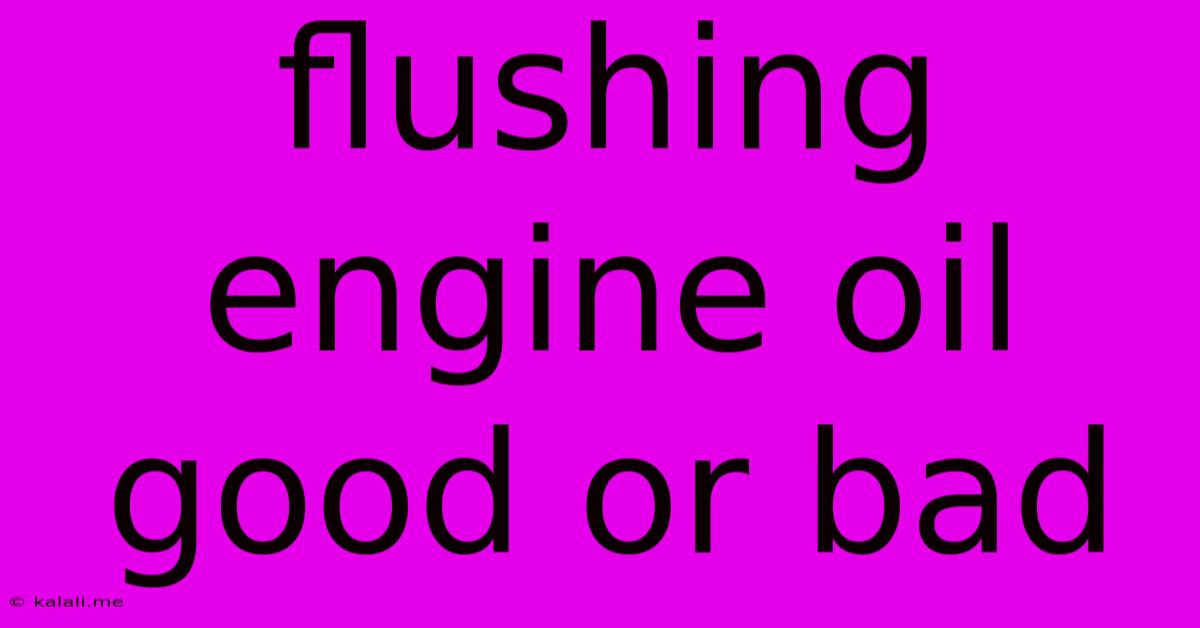Flushing Engine Oil Good Or Bad
Kalali
May 19, 2025 · 4 min read

Table of Contents
Flushing Engine Oil: Good or Bad? A Deep Dive into Engine Health
Meta Description: Should you flush your engine oil? This article explores the pros and cons of engine oil flushing, examining different flush types and offering guidance on when it's beneficial and when it's potentially harmful to your car's engine.
Changing your engine oil is a crucial part of car maintenance. But what about engine oil flushes? Are they a necessary addition to your routine, or a potentially damaging procedure? The answer isn't a simple yes or no. The effectiveness and safety of an engine oil flush depend heavily on several factors, including the type of flush used, the condition of your engine, and your vehicle's overall maintenance history.
Understanding Engine Oil Flushes
Engine oil flushes are designed to remove sludge, varnish, and other deposits that accumulate within your engine over time. These contaminants can reduce engine efficiency, increase wear and tear, and even lead to significant engine damage. There are two main types of oil flushes:
- Chemical Flushes: These are often liquids added to the engine oil before an oil change. They contain chemicals designed to dissolve and loosen deposits. After a short running period, the flush and old oil are drained.
- System Flushes: These typically involve a machine that circulates a cleaning fluid through the engine, removing contaminants more effectively than a simple chemical flush. This method is generally more thorough but also more expensive.
The Case for Engine Oil Flushing
In certain situations, an engine oil flush can be beneficial:
- Severe Sludge Buildup: If your engine has significant sludge buildup, a flush can help remove these deposits, improving engine performance and extending its lifespan. This is often seen in vehicles that have been poorly maintained or have used the wrong type of oil.
- Preparing for a Major Repair: Before a significant engine repair, such as a rebuild or gasket replacement, flushing the engine can help remove debris that could damage the newly installed components.
- Switching Oil Types: When switching from a conventional oil to a synthetic oil, or vice-versa, a flush can help remove the remnants of the old oil and ensure the new oil performs optimally.
The Arguments Against Engine Oil Flushing
Despite the potential benefits, there are significant arguments against routine engine oil flushing:
- Potential for Damage: Aggressive chemical flushes can dislodge stubborn deposits that could clog oil passages or damage sensitive engine components. This is especially risky in older engines with higher mileage.
- Unnecessary for Well-Maintained Engines: For vehicles that receive regular oil changes with the correct type of oil, a flush is often unnecessary. Consistent maintenance prevents the buildup of significant sludge.
- Voiding Warranties: Some manufacturers' warranties might be voided if an engine flush is performed, particularly if it leads to engine damage. Always check your owner's manual.
When to Consider an Engine Oil Flush
The decision of whether or not to flush your engine oil should be based on individual circumstances. Consider these factors:
- Vehicle's Age and Mileage: Older vehicles with high mileage are more susceptible to sludge buildup and might benefit from a flush. However, proceed cautiously, particularly with high-mileage engines.
- Maintenance History: A consistent oil change schedule with the recommended oil type significantly reduces the need for a flush.
- Engine Condition: Visible signs of sludge or unusual engine noises might suggest the need for a flush, but it’s crucial to consult a mechanic first.
Alternatives to Engine Oil Flushing
Rather than opting for a potentially risky flush, prioritize preventative maintenance. This includes:
- Regular Oil Changes: Sticking to the manufacturer's recommended oil change intervals is crucial.
- Using the Correct Oil: Use the type and grade of oil specified in your owner's manual.
- Addressing Leaks Promptly: Fixing oil leaks prevents oil loss and keeps the engine lubricated.
Conclusion: Proceed with Caution
While an engine oil flush can be beneficial in specific cases, it's not a routine maintenance procedure that should be performed regularly. The risks associated with aggressive flushes often outweigh the benefits for well-maintained vehicles. Always consult a qualified mechanic before deciding whether an engine oil flush is appropriate for your car. Prioritizing regular oil changes and proper oil selection is generally a safer and more effective way to maintain engine health.
Latest Posts
Latest Posts
-
Do Lupins Come Back Every Year
May 19, 2025
-
Standard Height Of A Door Knob
May 19, 2025
-
Improve Water Pressure In Shower Head
May 19, 2025
-
How Long Do Scrambled Eggs Stay Good In The Fridge
May 19, 2025
-
Can You Dry Socks In The Microwave
May 19, 2025
Related Post
Thank you for visiting our website which covers about Flushing Engine Oil Good Or Bad . We hope the information provided has been useful to you. Feel free to contact us if you have any questions or need further assistance. See you next time and don't miss to bookmark.